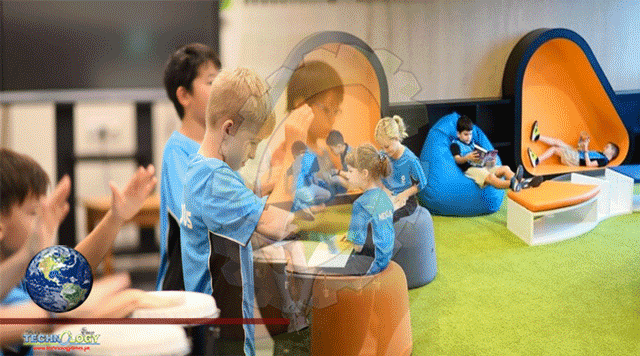Enter STEAM education, where an Arts component that makes up the additional A in STEM is not merely an afterthought. A STEAM-based educational approach injects creativity and out-of-the-box thinking to analytical processes in problem solving.

What truly drives innovation? In a rapidly changing world where everything is result-driven, classrooms all over the world have woven STEM (Science, Technology, Engineering and Mathematics) initiatives into lessons to equip students with technical and digital literacy to meet the demands of future careers. Yet, technical knowledge alone is insufficient for original invention.
Enter STEAM education, where an Arts component that makes up the additional A in STEM is not merely an afterthought. A STEAM-based educational approach injects creativity and out-of-the-box thinking to analytical processes in problem solving. This very principle underpins the pedagogical philosophy of Nexus International School Singapore, where STEAM education takes centre stage at a brand-new futuristic campus purposely designed for innovative learning.
Purposeful education from the ground up
At Nexus, an open mind starts with an open space. Anyone strolling through its campus grounds will see that the school’s spatial configuration is reflective of its educational ethos. The result of a thoughtful, award-winning design speaks for itself: students can choose spaces of different sizes that best fit their learning styles, explore lessons in a double-storey treehouse, enjoy outdoor picnics at a spacious play deck, socialise in verdant lounges, or unwind on bean bags in flexible learning spaces.
Nexus recognises that teaching extends beyond four walls, hence why teachers were central to the school’s design process. With input from educators, the modern campus caters to the diverse learning needs of its students. Whether it’s a kindergartener exploring Art for the first time, or secondary learners experimenting with Augmented Reality projects at the Science Mega Lab, Nexus STEAM-centric education is alive within its very architecture to enhance a student’s learning experience.
The Nexus Way: Creativity and empathy for real-world impact
When Patricia Vlad came on board as a teaching staff at Nexus, the first thing that impressed upon her was how open-mindedness thrived among its students. “I’ve never seen a school with children asking so many questions! I found it quite refreshing, because it means that everyone is very interested and really involved,” says the Design Teacher and Learning Area Leader. “It means that we are creating the citizens of tomorrow who are really invested in their learning, learning about the world, and how they can contribute to it.”
The secret to this unrestrained curiosity lies in “The Nexus Way”, a guiding philosophy that the school adopts to cultivate creative mindsets, supportive interpersonal relationships, self-awareness and empathy, as well as transformative innovation. Nexus knows that a stellar, well-rounded student isn’t built in a day; these traits are nurtured throughout their learning years, from life-changing discoveries in Preschool to impactful decision-making in Secondary School.
A key feature of The Nexus Way is how students get to personalise learning based on their own perspectives and experiences. Take the interior design unit for Year 7 students in the Middle Years Programme for example, which puts the Arts component in STEAM. This unit is one of several initiatives by Nexus to encourage self-expression in a Design curriculum.
Like true professionals, students get to experience the entire interior design process firsthand, while infusing personal touches along the way to create furniture pieces or cardboard rooms that mirror their own living experience during the pandemic, but are created in response to the needs of families from disadvantaged communities.
“Part of the design process is about having empathy for somebody else and asking ‘what do they need?’” explains Vlad, who teaches Design in the International Baccalaureate Middle Years Programme, English National Curriculum classes, and International General Certificate of Secondary Education programme.
Building emotional intelligence is a constant work in progress, hence why Nexus is careful to weave empathy at each stage of its curriculum. “A big part of the MYP curriculum is related to the empathy aspect, specifically in the area of global context,” she adds.
Thanks to the guidance of highly-qualified and seasoned teachers, STEAM education at Nexus also gears students towards global citizenship. A Nexus student learns early on that knowledge isn’t about acquisition; it’s about leveraging your education for actionable change in society. Nexus students participate in community work such as building medical centres for underprivileged communities in Southeast Asia and devise solutions for affordable housing — all of which occur at the crossroads of design, innovation and the value of empathy for a human touch in STEAM learning.
Being an Apple Distinguished School readies Nexus learners to become active digital citizens through technology. Each student is equipped with an iPad, which makes them readily adaptable to virtual learning during pandemic lockdowns. “We have completely used iPads all the way through. That’s been a part of our journey as well to improve creativity,” explains Ed, Nexus’s Digital Learning Coach. “We see a lot of students now drawing on their iPad, making movies, and really using the iPad features to express their creativity.”
As an MYP Design and Digital Skills Teacher, Ed finds the students’ willingness to try new things encouraging for STEAM development, especially in coding. “We’ve seen a big increase in interest in coding from everybody, but especially from girls,” says Ed. “It’s been really fascinating to see the shift — they’re coming into the school with so much more confidence and a can-do attitude to coding.”
“It shows that Design is the first subject where all the aspects of STEAM come together in an official curriculum,” Ed adds. The STEAM curriculum at Nexus is changing the way students arrive at solutions through authentic inquiry, creativity and empathy. With an everything-is-possible mentality, Nexus students are well on their way to meet the challenges of the future.
Source: Study International
